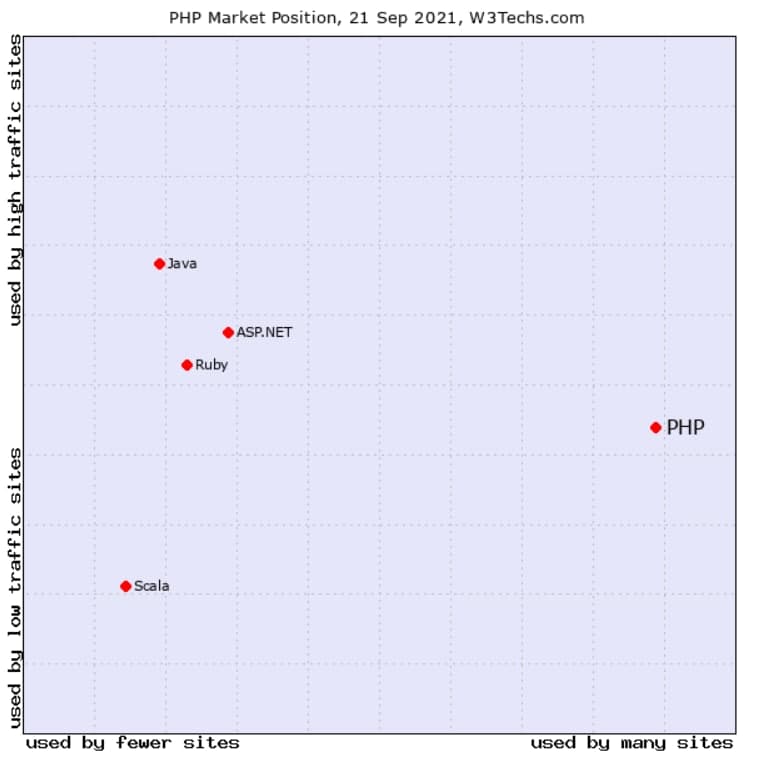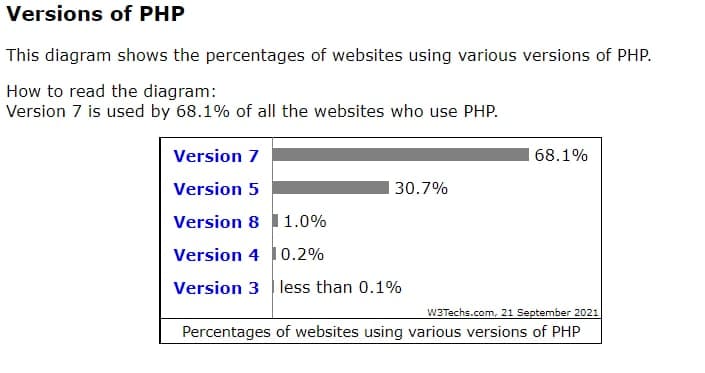 ×
×
 ☰
☰
The world of the Internet is similar to the universe — there might be an end somewhere, but we can’t see it. Thousands of new websites are launched each and every day and this tendency doesn’t seem to stop. But have you ever wondered how these websites are made?
When it comes to picking the programming language, the choice can be hard to make. There are so many options available on the market that you might feel like a child in a candy store.
Nevertheless, programmers are used to choosing one or two languages to stay focused. Truth be told, being an expert in one technology is better than knowing several ones but on a beginner level. PHP is one such common technology that developers choose to focus on, and you may be wondering: “Why PHP?” or “Isn’t PHP outdated?”. And with this article, we will definitely answer the question.
PHP is known to be the most frequently used programming language. According to W3Techs, 78.8% of all websites are using PHP for their server-side.
Interesting fact: PHP originally stood for Personal Home Page. Now PHP is widely known and thought of as Hypertext Preprocessor.
So, what are the main benefits of using PHP for web development?
The first thing you need to know about PHP is that this technology is free in all senses. The crucial attribute of open source tech is the large community of developers working with it. Not only are they using PHP each day, but they are also continuously discussing it, thinking about improvements, and in fact bringing new positive changes and enhancements. Programmers can learn faster and implement cutting-edge solutions as soon as possible. Moreover, unlike many other programming languages, PHP has its own support. All these factors lead to the arrival of new frameworks, components, and other tools that make PHP even better.
Building a website or a web application, creators are probably looking forward to the projects’ growth. Therefore, scalability is very important as the website should grow and be able to handle increasing traffic. Websites built with PHP can be easily extended by adding more servers when needed. More users = more servers. Voila!
Since PHP uses its own memory, both workload and loading time are reduced. As a result, the processing speed is rather high, which is a benefit not only for developers but also for their clients who get the product delivered sooner. The speed of uploading is also crucial for SEO, so you shouldn’t dismiss this factor if you want to use your site for marketing and sales objectives.
Some claim PHP is not secure enough as it is open source. But the truth is that any programming language is prone and vulnerable, it’s just a matter of how they are used. The security level depends on the expertise of the developers and their practices. For example, one of the ways to avoid security breaches is to provide software testing. By the way, it’s an essential milestone of each project completed by our team.RELATED ARTICLEWe pay a lot of attention to cybersecurity. Learn what measures we use to protect the software we develop.
Since PHP is open-source, it doesn’t require any additional expensive software to work with. You don’t have to pay for any extra licenses or royalty fees, and there are no restrictions. Due to the multiple integration options, using PHP is free of charge and that reduces the overall development costs.
The server-side PHP is the best tool for creating custom websites as it’s not limited by any custom options. Hence, developers can create a web platform based on PHP that exactly matches the clients’ needs. For instance, combined with JavaScript, the dev team can build a functional and at the same time good-looking website.

Need to build a web application on PHP?
Let’s discuss our possibilities for your PHP website development.Request a quoteRequest a quote

As we said before, a very large share of websites all over the Internet are built with PHP. But you might be interested in the really large platforms that have used this programming language. The shortlist below should be enough to convince you:
PHP was considered a very easy and “light” solution in the past. That is due to its easy deployment and prompt development-to-release cycle. Your project can be completed quickly even by relatively inexperienced programmers. Today, this still remains one of PHP’s biggest advantages. Nevertheless, the number and variety of possibilities have increased dramatically as PHP version 7.4 is much more powerful than its predecessor (update: PHP 8 was released at the end of 2020). Why and how does that happen?

Currently supported version of PHP, source: php.net
Some updates are unimportant, introducing only incremental changes. Others, though, can totally reshape the whole product. That happened with PHP when the majority of new frameworks empowered PHP to do bigger and greater things. Among them are Symfony, Laravel, Lamina, Yii, Cake, Code Igniter, and others. We use and like Yii2. It is our personal favorite and since we admire it so much, we would recommend that e you go with this framework as well.

Need help with PHP and its framework?
We are ready to share our experience to power up your development.Consult with our expertsConsult with our experts
Frameworks come with packages and products such as admin panels, CRMs, web sockets servers, profilers, payment integrations, queuing managers – to name a few. They create a certain ecosystem that allows working with PHP much faster and easier. This is required by the rapid progress of the Web with more interactive features, sophisticated design, and richer functionality. You can go beyond Content Management Systems like WordPress and do pretty much anything, combining a library of your choice with a framework that best suits the task at hand.
Comparing PHP 5 with PHP 7/8, it is worth mentioning that performance (speed) has increased 2 or 3 times. Therefore, most of the arguments against PHP have become obsolete over time. That means that the community of developers behind PHP takes criticism as constructive feedback seriously and uses it to improve.

Some programming languages decline in quality over time. With PHP, it’s the opposite, since the demand is constantly on the rise. New challenges demand improvements and yearly updates deliver these improvements. Backend done with PHP today is not just a database addition to your front-end development. Much more diverse tasks like data gathering, redirection, integration with mobile, etc., can easily be done with PHP.
Considering everything that has been said, it would be true to state that PHP has become more efficient and able to handle different tasks while staying user-friendly and cheap. For commercial projects, PHP is the best choice, thanks to its light syntax and quick onboarding.
What else can be said about PHP? Its simplicity is both an advantage and a disadvantage. It doesn’t suit the development of complex systems for some academic research systems, for example. But all commercial projects are alike, and they can be sophisticated from the marketing point of view, yet quite easy to handle from the programming side.
Based on this, many claim that PHP is the best commercially used programming language all around the world. Teamed up with JavaScript, PHP can be used to see any kind of project through to a successful release with no problems. It is like English among programming languages. Everybody knows it, it can be adapted quickly and used for a virtually infinite number of purposes.
What else is there to say about the beauty of PHP? On average, it takes less time to deliver a project using PHP than when some other programming language is chosen and used for the task at hand. Less time means your project is going to be released faster. Therefore, developing the MVP of your product with PHP will make it more likely that your product is still going to reach your target audience in time to be relevant and topical, leaving your competition in the dust. Time to market is dramatically reduced when you use PHP as your language of choice.
Furthermore, it is much easier to find programmers who have knowledge of PHP than any other programming language. Therefore, having a bigger pool of talent to choose from, you won’t be left without qualified specialists. That is because PHP is, as we have investigated earlier, very simple and easy as compared to other software programming languages.
Hourly rates of PHP developers are also 15% less expensive than that of, for example, Python developers or Ruby developers. Therefore, the developer is easier to find and cheaper to hire. Isn’t that wonderful?
We specialize in custom development but in case you are going to need to integrate some third-party CMS solutions like WordPress or Wix, it is very easily done with PHP. You can do parts of your project with PHP or you can do it all with PHP, depending on what kind of functionality your business model is going to require.
PHP supports many database options, from MSSQL and IBM to DB2 and Oracle OC18. With more database options it is easier to handle your data and redirect it. Faster speed allows fluent and fast work of all embedded systems.
Some say that if their platforms were built today, they would not choose PHP for the development. But we don’t agree with such statements. PHP is convenient, easy to learn, has many useful libraries, detailed documentation, and what is very important — has a huge community. Some might call this language old, while we consider it to be one of the classics.RELATED ARTICLENeed more information on PHP website development costs or web portal development cost? We have a separate article covering this topic.
PHP is a technology that constantly stays in demand by a company. We suggest PHP for web development for the server-side of their web application due to:
The good news is that PHP can be successfully implemented in any industry. We’ve used this language for projects in the following fields and expertise:
So, if you choose PHP for the back-end, what other technologies might you need to go along with that? We usually combine PHP with JavaScript and its frameworks for front-end, MySQL as the database engine, AWS as hosting.
So, to give you an idea of the projects we usually work on, here is an estimation for an ERP system for a concrete material manufacturer that is needed to automate processes and increase the productivity of the company. PHP and its framework Yii2 was chosen as a server-side language, and JS was picked for the client-side.
| Specialist | Hours | Cost |
| Product Owner | 178 | $6,942 |
| Designer | 292 | $9,344 |
| HTML/CSS developer | 416 | $10,400 |
| JavaScript developer | 718 | $28,720 |
| PHP developer | 868 | $30,380 |
| QA engineers | 663 | $16,575 |
| System Administrator | 41 | $1,599 |
| Project Manager | 479 | $20,118 |
As you can see from the estimation, the hourly rate of the PHP developer for this project is $35. The rate of a Node.js developer with the same level of expertise will cost you around $50 per hour. The difference is significant, so we suggest you don’t jump to conclusions in labeling PHP as an outdated technology so as to not automatically dismiss it, but evaluate its benefits and consider playing to its strengths.
To put it simply, the choice of the development language is a compromise between the pros and cons of the available options. PHP is a language that can be used to build any kind of website in 2022, starting with landing pages and simple WordPress websites, and ending with complex web platforms like that of Facebook.
Flexibility, nativity, multiple integration opportunities and high speed are among the chief reasons we use PHP for web development in our projects.
Source: ALTIMIRA